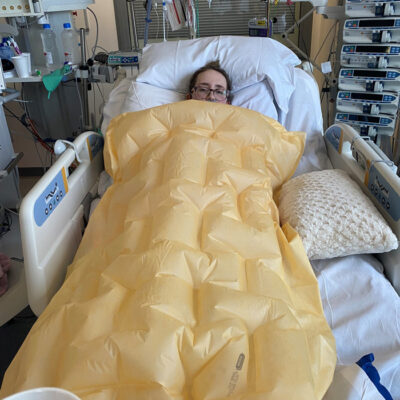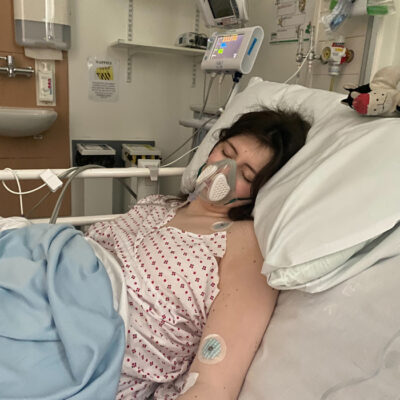Parents of critically ill teenagers who had to sit GCSE exams days after major surgery or chemotherapy are demanding schools are allowed to give “tried and tested” teacher assessed grades (TAGs) instead.
Schools Week has spoken to three families whose year 11 children since March have developed life-threatening illnesses or been involved in devastating accidents.
All had to struggle through some exams – despite finishing their courses – as exam board guidance says pupils must complete some assessments to get a grade.
Reforms introduced by Michael Gove mean fewer subjects include coursework so are solely reliant on summer exams.
In hospital she should be concentrating on getting better, not sitting an exam
More than 170,000 people are now backing a petition calling for “fair” TAGs to be awarded to prevent sick teenagers being “penalised”.
Parents say schools have the evidence they need as they have spent hours internally assessing pupils’ abilities in case the pandemic forced exams to be cancelled.
Advisers to the exams regulator Ofqual also accept the system needs “more flexibility”, but the government seems unwilling to budge.
‘Hard work counts for nothing’
Grace Sanderson, 16, was diagnosed with acute myeloid leukaemia on March 11. Three days later she began chemotherapy, spent 16 days in intensive care and had only spent six nights at home when her exams began.
Her mum Emma was told Grace would have to complete an exam in most subjects to get a grade, or resit next summer. This is despite Grace completing most of her GCSE syllabuses at Northallerton High School and being predicted grade 7 and 8s.
The Joint Council for Qualifications (JCQ) special consideration guidance says for enhanced grading in “acceptable absences”, 25 per cent of the total assessment must have been completed. Candidates must have been “fully prepared” and covered the whole course.
The pandemic also allows awarding bodies this year to give a grade if eligible candidates have completed assessment for at least one whole component in the specification.
Grace, who is still in and out of hospital, has managed to sit a paper in French and media studies. She was too unwell for the remaining subjects, all without coursework.
The Department for Education said pupils could take exams in hospitals. But Emma said this was “inappropriate”. “She should be concentrating on getting better in hospital, not sitting an exam.”

In a letter, the exam board AQA said if Grace wasn’t well enough to take exams and hadn’t completed one component per subject “we wouldn’t be able to award her a result based on her homework and mock exam results”. It could only award TAGs if exams were cancelled nationwide.
If offered to provide a “letter of recognition” to show what Grace was achieving before she was unwell, but JCQ guidance said this had “no academic value”.
“If this had been her last year with TAGs when exams were cancelled she would have been absolutely fine,” Emma said. “So this is like a kick in the teeth and says hard work counts for nothing.
“We are not asking them to do anything that has not been tried and tested.”
She launched the petition a month ago, which has so far been signed by more than 173,000 people.
Schools ‘incredibly frustrated’
On Good Friday, 16-year-old Hannah Harmsworth, from Reading, suffered a severe brain injury after she was accidentally hit on her head with a golf club.
She had surgery and was in an induced coma for 12 days, then in hospital for six days.
The Highdown School pupil was also only home for six days before exams began. She later had to have a large piece of skull removed after a serious infection, and sat an exam five days later.
The resilient teenager has managed an exam in most subjects, but writing and processing thoughts take her longer.
Mum Laura said: “She’s got a real strong sense of justice and rules and regulations. She couldn’t understand why she wouldn’t get TAGs when she’s been doing the extra work [during the year].”

Andy Franks, her school’s deputy headteacher, said the situation was “incredibly frustrating”. “We’ve had two years of us being deferred responsibility and being trusted with the judgment to make decisions on children’s grades. We’ve got explicit evidence that would’ve supported a CAG [centre-assessed grade] for Hannah.”
Mollie Fay had emergency surgery after a perforated appendix two days into the exams, leaving more than 20 staples down her stomach. Doctors told mum Mandi if they’d waited any longer she could have died. She is still fighting infections.
The 16-year-old was able to sit an English and maths exam at her Nottinghamshire home. Her mum said she “couldn’t concentrate as she hadn’t been given her morphine, but she tried her hardest. It broke my heart.”
While Grace and Hannah have been told they can stay on for A-levels, Mollie is awaiting a meeting with her college. She hopes to become a midwife.
Emma believes pupils in this position are facing discrimination as cancer is a disability under the Equality Act 2010.
Laura Berman, a partner at the law firm Stone King, said Grace could possibly challenge the boards and argue she was indirectly discriminated against or that there was a failure to make reasonable adjustments.
But indirect discrimination can be justified if it can be shown to be “a proportionate means of achieving legitimate aim”. So the boards may argue there is no mechanism to allow TAGs this year as it was part of a temporary Covid framework and other adjustments have been made.
‘More exams flexibility needed’
Professor Barnaby Lenon, a former Ofqual adviser, said bringing back coursework for each subject in case students fell ill was not “a good idea”. In some subjects, such as maths, it had “little value”.
But he supported the use of TAGs. “There is an argument for going further than that – with proper training of teachers it would be possible for all exam candidates to be given an exam grade and a TAG, which the users of exam grades could take into account if they wished to.”

Professor Jo-Anne Baird, who sits on Ofqual’s standards advisory board, said more flexibility was needed as “more generally, society is demanding that assessments are designed to address the diverse needs of students”.
“Where there is accountability pressure on teachers to deliver good grades, there are conflicts of interest for the professionals producing [teacher estimates]. This needs to be taken into account – those grades produced by teacher estimates could be taken out of the school performance tables, for example.”
Geoff Barton, the general secretary of the school leaders’ union ASCL, said that as schools banked grade evidence this year, TAGs were “certainly something that Ofqual could consider in the small number of cases where this situation applies, although it isn’t straightforward to ensure comparability across two very different approaches to assessment.

“In the longer term, we do favour a reform of the exam system so that it is less reliant on end-of-course exams and utilises a greater range of assessment methods, including online assessment.”
A JCQ spokesperson said it was “incredibly sympathetic” to students in these situations. “While there are guidelines that the exam boards must follow, they will always consider exceptional circumstances and deal with them on a case-by-case basis.”
Ofqual said exam boards had a duty to make “reasonable adjustment” for disabled students. A Department for Education spokesperson added: “We recognise that GCSEs mark the end of years of hard work, and to be diagnosed with a serious illness so close to exams is an incredibly challenging and upsetting experience.”
















Your thoughts